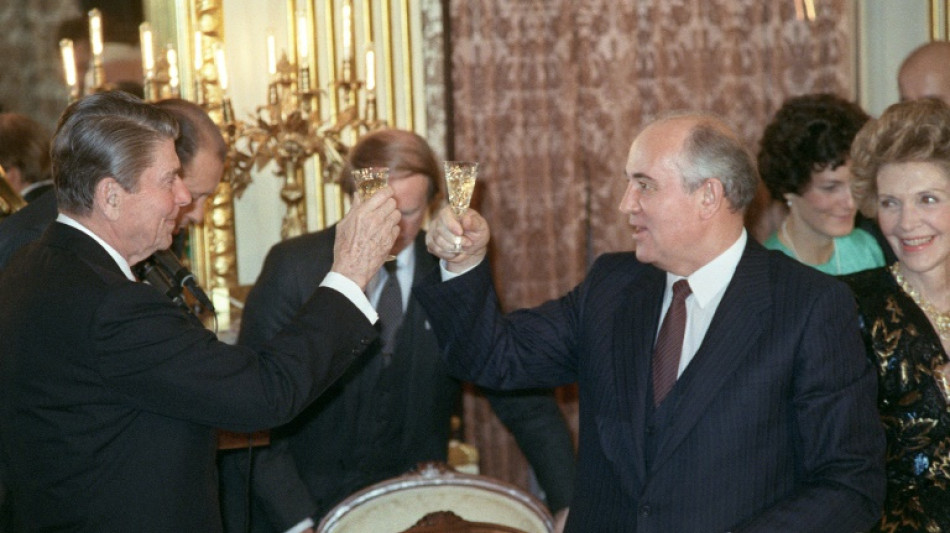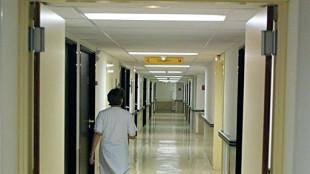
-
 Palestinians welcome ICC arrest warrants for Israeli officials
Palestinians welcome ICC arrest warrants for Israeli officials
-
Senegal ruling party wins parliamentary majority: provisional results

-
 Fiji's Loganimasi in for banned Radradra against Ireland
Fiji's Loganimasi in for banned Radradra against Ireland
-
New proposal awaited in Baku on climate finance deal

-
 Brazil police urge Bolsonaro's indictment for 2022 'coup' plot
Brazil police urge Bolsonaro's indictment for 2022 'coup' plot
-
NFL issues security alert to teams about home burglaries

-
 Common water disinfectant creates potentially toxic byproduct: study
Common water disinfectant creates potentially toxic byproduct: study
-
Chimps are upping their tool game, says study

-
 US actor Smollett's conviction for staged attack overturned
US actor Smollett's conviction for staged attack overturned
-
Fears rise of gender setbacks in global climate battle

-
 'World's best coach' Gatland 'won't leave Wales' - Howley
'World's best coach' Gatland 'won't leave Wales' - Howley
-
Indian PM Modi highlights interest in Guyana's oil

-
 Israel strikes kill 22 in Lebanon as Hezbollah targets south Israel
Israel strikes kill 22 in Lebanon as Hezbollah targets south Israel
-
Argentina lead Davis Cup holders Italy

-
 West Bank city buries three Palestinians killed in Israeli raids
West Bank city buries three Palestinians killed in Israeli raids
-
Fairuz, musical icon of war-torn Lebanon, turns 90

-
 Jones says Scotland need to beat Australia 'to be taken seriously'
Jones says Scotland need to beat Australia 'to be taken seriously'
-
Stock markets push higher but Ukraine tensions urge caution

-
 IMF sees 'limited' impact of floods on Spain GDP growth
IMF sees 'limited' impact of floods on Spain GDP growth
-
Fresh Iran censure looms large over UN nuclear meeting

-
 Volkswagen workers head towards strikes from December
Volkswagen workers head towards strikes from December
-
'More cautious' Dupont covers up in heavy Parisian snow before Argentina Test

-
 UK sanctions Angola's Isabel dos Santos in graft crackdown
UK sanctions Angola's Isabel dos Santos in graft crackdown
-
Sales of existing US homes rise in October

-
 Crunch time: What still needs to be hammered out at COP29?
Crunch time: What still needs to be hammered out at COP29?
-
Minister among 12 held over Serbia station collapse

-
 Spurs boss Postecoglou hails 'outstanding' Bentancur despite Son slur
Spurs boss Postecoglou hails 'outstanding' Bentancur despite Son slur
-
South Sudan rejects 'malicious' report on Kiir family businesses

-
 Kyiv claims 'crazy' Russia fired nuke-capable missile
Kyiv claims 'crazy' Russia fired nuke-capable missile
-
Australia defeat USA to reach Davis Cup semis

-
 Spain holds 1st talks with Palestinian govt since recognising state
Spain holds 1st talks with Palestinian govt since recognising state
-
Stock markets waver as Nvidia, Ukraine tensions urge caution

-
 Returning Vonn targets St Moritz World Cup races
Returning Vonn targets St Moritz World Cup races
-
Ramos nears PSG return as Sampaoli makes Rennes bow

-
 Farrell hands Prendergast first Ireland start for Fiji Test
Farrell hands Prendergast first Ireland start for Fiji Test
-
Gaza strikes kill dozens as ICC issues Netanyahu arrest warrant

-
 Famed Berlin theatre says cuts will sink it
Famed Berlin theatre says cuts will sink it
-
Stuttgart's Undav set to miss rest of year with hamstring injury

-
 Cane, Perenara to make All Blacks farewells against Italy
Cane, Perenara to make All Blacks farewells against Italy
-
Kenya scraps Adani deals as Ruto attempts to reset presidency

-
 French YouTuber takes on manga after conquering Everest
French YouTuber takes on manga after conquering Everest
-
Special reunion in store for France's Flament against 'hot-blooded' Argentina

-
 'World of Warcraft' still going strong as it celebrates 20 years
'World of Warcraft' still going strong as it celebrates 20 years
-
Fritz pulls USA level with Australia in Davis Cup quarters

-
 New Iran censure looms large over UN nuclear meeting
New Iran censure looms large over UN nuclear meeting
-
The first 'zoomed-in' image of a star outside our galaxy

-
 ICC issues arrest warrants for Netanyahu, Gallant, Deif
ICC issues arrest warrants for Netanyahu, Gallant, Deif
-
Minister among 11 held over Serbia station collapse

-
 Historic gold regalia returned to Ghana's king
Historic gold regalia returned to Ghana's king
-
Kyiv accuses Russia of launching intercontinental ballistic missile attack


Gorbachev and Reagan: a friendship that ended the Cold War
Mikhail Gorbachev stepped onto a Washington street and began shaking hands to cheers and applause in 1990 -- a bit of unaccustomed political showmanship worthy of his friend Ronald Reagan.
Ana Maria Guzman was in the park on her lunch break that May when she saw the Soviet leader, who died on Tuesday at 91.
"We knew he was in town and we saw his motorcade. Then he just got out of his limousine and began shaking hands," she recalled. "It was very emotional. He was like a people's person. Wow!"
It was the personal touch that Reagan, the Hollywood actor who became president and an icon of the American right, was known for.
Reagan and Gorbachev broke through decades of tensions between their countries to form one of the unlikeliest relationships of the 20th century, bonding over their shared desire to reduce nuclear tensions and ultimately bringing about a momentous shift in world politics.
- Overcoming decades of mistrust -
At the beginning, the longtime Soviet apparatchik had almost nothing in common with his US counterpart.
The two came from countries where mistrust of the other was set in cement.
But when Reagan came to office in 1981, one of his primary -- and secret -- goals was to ease Cold War and nuclear tensions with Moscow.
He made overtures to three Soviet leaders -- Leonid Brezhnev, Turi Andropov, and Konstantin Chernenko -- but all were change-resistant and none survived long enough to establish a relationship.
When Gorbachev became Communist party general secretary in March 1985 after Chernenko's death, the White House sensed a potential opening, said Jack Matlock, then Reagan's top negotiator with Moscow and later ambassador to Russia.
"Early in his term, Reagan referred to the Soviet Union as an evil empire," Matlock told AFP.
"But from the very beginning, he talked about negotiating and the possibility of establishing a peaceful relationship if the Soviet leader was willing to get along with the free world."
"There was very little response until Gorbachev. With Gorbachev, they finally began communicating, and within two or three years, they were almost, you might say, reading off the same piece of music."
Gorbachev was no blind idealist, said John Lenczowski, who was principal Soviet affairs adviser on Reagan's national security council.
The White House understood he was inheriting a weakened economy, a military that saw the Pentagon as increasingly superior and threatening, and a Communist Party rotting from the inside out.
Gorbachev needed to ease the military competition with the United States first if he was to address the other two challenges and preserve the Soviet Union.
"He came in to the general secretaryship seeing that the Soviet Union was in a state of multiple crises. He was trying to overcome those crises in order to save the Soviet system," said Lenczowski.
Reagan, for his part, saw Kremlin paranoia about the United States as dangerous for both.
"Reagan began to think that we really needed to tone it down, and to try to manage the relationship a little bit more gently," said Lenczowski.
He saw "that we were in a position of strength to negotiate better with Moscow, and that we should explore some of the different venues."
- Slow start -
Reagan had an invitation to visit Washington passed on to Gorbachev at Chernenko's funeral, but nothing much happened for months.
Still, the White House perceived a change in tone as the two sides discussed advancing nuclear arms control negotiations.
"Basically, they were both men of peace," said Matlock.
"Gorbachev really realized, increasingly, he had a system that needed to change. But he couldn't really change it as long as there was a Cold War going on, and you had the arms race."
"And I think that Reagan understood that. And Reagan was not out to bring down the Soviet Union."
Their big ice-breaker was a summit in Geneva in November 1985. Talks were tense, and little was agreed. But the two leaders had several one-on-one conversations, sowing the seeds of trust.
One year later, the two met in Reykjavik for more talks, again with only slight progress.
Media called the summit a failure, but in fact, Matlock recalled, both sides found more common ground. Detente was taking root.
When Gorbachev came to Washington in December 1987, he and Reagan were able to sign the landmark treaty on limiting intermediate range nuclear forces.
"At first he thought Reagan was very conservative," Matlock said of Gorbachev.
"But as time went on, and as they began to agree, more and more they actually became friends."
Long after he was shunted aside in Russian politics, Gorbachev would return to the United States in 2004 for Reagan's funeral.
"I think they both had similar ideals. They both hated nuclear weapons, and hoped that they could abolish them, that's the truth," Matlock said.
"Very few on their staffs thought that that was going to be possible, but they did."
E.Schubert--BTB

